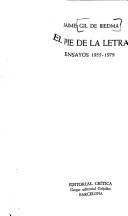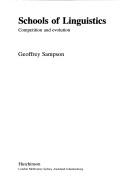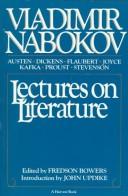| Listing 1 - 10 of 7752 | << page >> |
Sort by
|
Book
Year: 2005 Publisher: Genève : Pictet,
Abstract | Keywords | Export | Availability | Bookmark
 Loading...
Loading...Choose an application
- Reference Manager
- EndNote
- RefWorks (Direct export to RefWorks)
Places finacières --- Banque d'affaires --- Economie monétaire --- 1800 - ... --- 1800 - ... --- 1800 - ... --- Places finacières --- Banque d'affaires --- Economie monétaire --- 1800 - ... --- 1800 - ... --- 1800 - ...
Book
Year: 1973 Publisher: Heverlee-Leuven : Institut historique augustinien,
Abstract | Keywords | Export | Availability | Bookmark

ISBN: 847423137X Year: 1980 Publisher: Barcelona
Abstract | Keywords | Export | Availability | Bookmark
 Loading...
Loading...Choose an application
- Reference Manager
- EndNote
- RefWorks (Direct export to RefWorks)

ISBN: 0091414601 Year: 1980 Publisher: London Hutchinson
Abstract | Keywords | Export | Availability | Bookmark
 Loading...
Loading...Choose an application
- Reference Manager
- EndNote
- RefWorks (Direct export to RefWorks)

ISBN: 0151495971 Year: 1980 Publisher: New York, N.Y. Harcourt Brace Jovanovich, Publishers
Abstract | Keywords | Export | Availability | Bookmark
 Loading...
Loading...Choose an application
- Reference Manager
- EndNote
- RefWorks (Direct export to RefWorks)
Book
ISBN: 8474236908 Year: 1994 Publisher: Barcelona Crítica
Abstract | Keywords | Export | Availability | Bookmark
 Loading...
Loading...Choose an application
- Reference Manager
- EndNote
- RefWorks (Direct export to RefWorks)
Book
ISBN: 9781107149021 1107149029 Year: 2018 Publisher: Cambridge : Cambridge University Press,
Abstract | Keywords | Export | Availability | Bookmark
 Loading...
Loading...Choose an application
- Reference Manager
- EndNote
- RefWorks (Direct export to RefWorks)
"Begun as a short story in October 1921, two months before Conrad's sixty-fourth birthday, The Rover (1923) turned out to be the writer's last completed novel. After a slow beginning plagued by bouts of ill-health, Conrad discovered, as had happened several times throughout his career, that his subject invited more expansive treatment. The short story about an ageing French seaman returning 'home' after a lifetime of adventure and vicissitude slowly evolved into a short novel, and then into a full-length one. Once Conrad got into his stride, he completed it rapidly, by dictation, between January and mid-July 1922. For it, he laid aside his work in hand, Suspense (1925), with which he was already encountering difficulties and which would remain unfinished upon his death. Escaping a troubled work that had been on his desk for some time in favour of a much smaller canvas must have had immediate appeal. It also promised a consolidation of effort: the new story draws upon roughly the same historical epoch as Suspense--the French Revolution and Napoleonic periods--eras that Conrad had read about widely and had already mined for his short stories 'The Duel' (1908) and 'The Warrior's Soul' (1917)"-- "Set in the South of France during the waning days of the French Revolution and the early years of Napoleonic rule, The Rover (1923) is the last novel that Conrad completed in his lifetime. A popular success on its publication, it explores, against the backdrop of dramatic political change and the Anglo-French hostilities leading up to the Battle of Trafalgar, the themes of personal and national identity, loyalty and love. The 'Introduction' situates the novel in Conrad's career and traces its sources and contemporary reception. Explanatory notes illuminate literary and historical references and indicate Conrad's sources. The essay on the text and the apparatus lay out the history of the work's composition and publication, detail the interventions in the text by Conrad's typists, compositors and editors and explain editorial policy. This edition of The Rover, established through modern textual scholarship, presents the novel in a form more authoritative than any so far printed."--
Book
ISBN: 1299359248 1486495567 1486487955 Year: 2012 Publisher: Project Gutenberg
Abstract | Keywords | Export | Availability | Bookmark
Book
ISBN: 1399500929 1399500937 1399500902 Year: 2023 Publisher: Edinburgh : Edinburgh University Press,
Abstract | Keywords | Export | Availability | Bookmark
 Loading...
Loading...Choose an application
- Reference Manager
- EndNote
- RefWorks (Direct export to RefWorks)
Beginning with Sir William Hamilton's revitalisation of philosophy in Scotland in the 1830s, Gordon Graham takes up the theme of George Davie's 'The Democratic Intellect' and explores a century of debates surrounding the identity and continuity of the Scottish philosophical tradition. Graham identifies a host of once-prominent but now neglected thinkers - such as Alexander Bain, J.F. Ferrier, Thomas Carlyle, Alexander Campbell Fraser, John Tulloch, Henry Jones, Henry Calderwood, David Ritchie and Andrew Seth Pringle-Pattison - whose reactions to Hume and Reid stimulated new currents of ideas.
Multi
ISBN: 9783110402216 Year: 2014 Publisher: Berlin : De Gruyter,
Abstract | Keywords | Export | Availability | Bookmark
 Loading...
Loading...Choose an application
- Reference Manager
- EndNote
- RefWorks (Direct export to RefWorks)
| Listing 1 - 10 of 7752 | << page >> |
Sort by
|

 Search
Search Feedback
Feedback About UniCat
About UniCat  Help
Help News
News